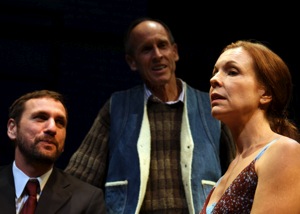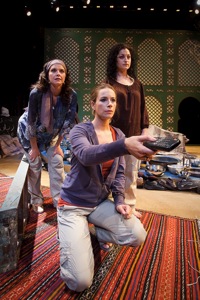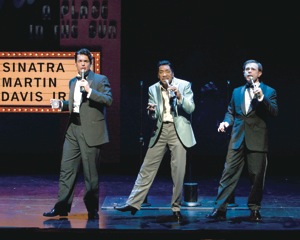Theater
The loss of faith, the aftermath of war and the life of a great entertainer
Published Thursday, 22-Oct-2009 in issue 1139
‘Man from Nebraska’
It’s a rare playwright who writes silence into a script. Many people are discomfited by the emptiness silence seems to imply, but Tracy Letts – one of the best and bravest playwrights around – makes silence almost a character in Man from Nebraska, a 2004 Pulitzer Prize finalist.
The San Diego premiere of Man from Nebraska plays through Sunday, Nov. 1 at Cygnet Theatre. Francis Gercke directs.
Middle-aged Ken Carpenter (Mike Rich Sears) and his wife Nancy (Robin Christ) drive, watch TV, and eat with no more than a dozen words exchanged. It’s not anger or rancor; this is simply a longstanding marriage that plods along on automatic pilot. Ken and Nancy seem to have run out of things to say.
At the end of this day, Ken finds himself on the bathroom floor, weeping uncontrollably. When Nancy asks what’s wrong, he says he’s having a crisis of faith: “I don’t believe in God.”
It isn’t clear whether this is a spiritual problem or just a midlife crisis. Grown daughter Ashley (Amanda Sitton) has no patience with her father, but the local minister suggests he take a trip – alone – for R&R. He heads for Paris (inspired by fond memories of wartime service there); the adventure begins on the plane, where ballsy redheaded seatmate Pat Monday (Linda Libby) makes a play.
Meanwhile, Nancy is left to deal with visits to her aged and nearly deaf mother-in-law Cammie (Sandra Ellis-Troy) in the nursing home, and with clumsy overtures from Rev. Todd’s father Bud (Jack Missett), who tries to move in on her, convinced that Ken will never return. As he delicately puts it, “You just have to ask yourself, why would he come back?”
In a series of amusing scenes in the City of Light, Ken will experience aspects of life heretofore unknown: drinking too much, seduction, and British counterculture. He will even take a stab at sculpture, thanks to barmaid Tamyra (Monique Gaffney), who introduces him to her sculptor boyfriend and flatmate Harry Brown (Jeffrey Jones).
Letts’ warm and human piece gets expert interpretation from Gercke and company. Sears is heartbreaking as the man who has lost his way, funny in his fish-out-of-water scenes and totally believable throughout.
Christ turns in another solid performance as the bewildered Nancy, whose world is suddenly upended for reasons she cannot understand.
This show has the strongest supporting cast seen in a while: Gaffney, Libby, Sitton, Jones, DeCarlo, Missett and Ellis-Troy all turn in gemlike performances.
Set designer Brian Redfern reflects Ken’s bereft psychological state in his spare, propless set. Three walls serve as screens for projections indicating location. Straight-backed chairs are moved around to serve as chairs, bed, car seats. Characters hold imaginary drinks, set an imaginary table with unseen tableware.
Man from Nebraska speaks to all who have asked the age-old existential questions. Though Letts doesn’t offer any new answers, he portrays the quandary well.
Man from Nebraska plays through Sunday, Nov. 1, at Cygnet Theatre in Old Town. Shows Wednesday and Thursday at 7:30 p.m.; Friday and Saturday at 8 p.m.; Sunday at 7 p.m.; matinees Saturday and Sunday at 2 p.m. For tickets, call 619-337-1525 or visit www.cygnettheatre.com.
‘9 Parts of Desire’
Seventh-century imam Ali ibn Abu Talib taught that”God created sexual desire in ten parts; then he gave nine parts to women and one part to men.”
But 9 Parts of Desire, based on women playwright Heather Raffo interviewed in Iraq in 1991, is not about sex. It’s about survival, and these women have more basic needs: shelter, food, safety, recognition, even a bit of freedom.
Raffo, American with an Iraqi father, originally wrote this as a short piece for a class project at the University of San Diego. Later she fleshed it out and presented it as a solo show in Edinburgh in 2003 and later in London and New York, receiving a Susan Smith Blackburn Prize Special Commendation and a Lucille Lortel Award for Best Solo Show.
Mo’olelo Performing Arts Company presents 9 Parts of Desire through Sunday, Nov. 1 at the 10th Avenue Theatre. Janet Hayatshahi directs.
Before a blue Islamic arch, nine Iraqi women portrayed by three actors – Lisel Gorell-Getz, Frances Anita Rivera and Dré Slaman – pass the black abaya (robe) back and forth as each woman speaks about her life.
Artist Layal (Gorell-Getz) is the dominant character, and the easiest for westerners to relate to. A bit of a daredevil, she flings the abaya carelessly around her shoulders like a shawl. A collaborator (despite the brutal murder she describes Uday as perpetrating), she has found favor with Saddam’s regime, perhaps because she is free with her sexual favors (“I’ve been raped and raped and raped and I want more”). After all, “Isn’t everything in this country a matter of survival?” she asks.
Gorell-Getz also plays Umm Ghada, who speaks movingly of the day in 1991 that she became the only survivor of American planes that bombed the shelter holding her and nine of her family members, and a Basra doctor (Gorell-Getz) who laments the huge increase in genetic mutations among the newborn.
The old exile Huda (Slaman), in her seventies, speaks proudly of being a dissident all her life. “In ‘58 anybody who was intelligent was Communist. When I lived in Beirut during their war, I protested too. Everywhere I go there is a war.”
Slaman also plays a young Girl who dances with abandon to N’Sync but also knows the make of U.S. tank that took out much of her house, and collects the bullets and guns she finds.
Rivera’s lively Bedouin Amal has left two husbands and been abandoned by a third prospect; still, she looks for love, certain it is out there. She now lives in London so her children can see their father. But “I have no peace; always I am looking for peace,” she says. Rivera also plays an American in New York anxious about her family’s safety in Iraq.
Several of these characters tell harrowing stories; it is impossible not to be moved by them. But impeding the telling somewhat is the decision to vary accents according to the speaker’s background and education level, which creates barriers to comprehension. The directorial judgment to have one character echo another’s line is a bit off-putting as well.
Gorell-Getz leads this fine cast with her outstanding portrayals, but I couldn’t help thinking the piece would be better done in its original solo incarnation.
9 Parts of Desire plays through Sunday, Nov. 1, at the10th Avenue Theatre. Shows Thursday through Saturday at 7:30 p.m.; matinee Sunday at 2 p.m. For tickets, call 619-342-7395 or visit www.moolelo.net
‘Sammy’
Called by many “the greatest entertainer the world has ever seen,” Sammy Davis, Jr. broke down more than a few barriers in his career as singer, dancer and entertainer.
Davis was a showbiz kid, born in 1925 to vaudeville dancers. After his parents split, the 4-year-old Sammy went on the road with his father Sammy and “uncle” Will Mastin, where he began his career.
The Old Globe Theatre presents the new musical bio Sammy through Sunday, Nov. 8. Keith Glover directs.
Leslie Bricusse, who knew Davis well, wrote book, music and lyrics (and many of Sammy’s greatest hits, among them “What Kind of Fool Am I,” “Gonna Build a Mountain,” “The Candy Man”); he and Anthony Newley wrote 15 additional songs for the show, which has Broadway ambitions. That’s a lot of music – 23 songs – but none of the new songs can compare to the ones everyone will come to hear.
The show boasts a great cast, headlined by Broadway veteran Obba Babatundé (Dreamgirls, Jelly’s Last Jam), who traveled with Davis for some years. He doesn’t imitate (who could?) as much as try to distill the essence of the man. It’s a tall (or short, in this case) order, and Babatundé triumphs.
Sammy’s grandmother Rosa Davis (Ann Duquesnay) provided his center, the home he could always return to. Duquesnay’s big, round voice sounds like home should feel, and she steals the show whenever she’s onstage.
Davis led an eventful life during a pivotal period in the nation’s history, and Bricusse tries to get it all in – the accident that cost him his left eye, the racism, his controversial marriage to Swedish actress May Britt, his conversion to Judaism – but the inclusionary instinct (scattershot approach?) leads to a one-over-lightly approach that left me wishing for less celebrity bio and more understanding of why this man mattered.
The show also suffers from tech overload, with sets that seem in constant motion. Alexander Dodge’s sets aren’t that evocative in the first place; moving them only concentrates the attention on that fact.
Sammy has a future: it has a subject that will interest many, a great cast and fine choreography. It needs tightening and focus. But even as it stands, it’s good entertainment.
Sammy plays through Sunday, Nov. 8, at the Old Globe Theatre. Shows Sunday, Tuesday and Wednesday at 7 p.m.; Thursday through Saturday at 8 p.m.; matinees Saturday and Sunday at 2 p.m. For tickets, call 619-23-GLOBE or visit www.TheOldGlobe.org.
|
|
Copyright © 2003-2025 Uptown Publications




